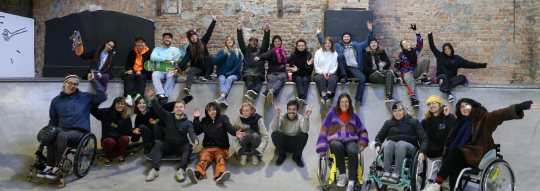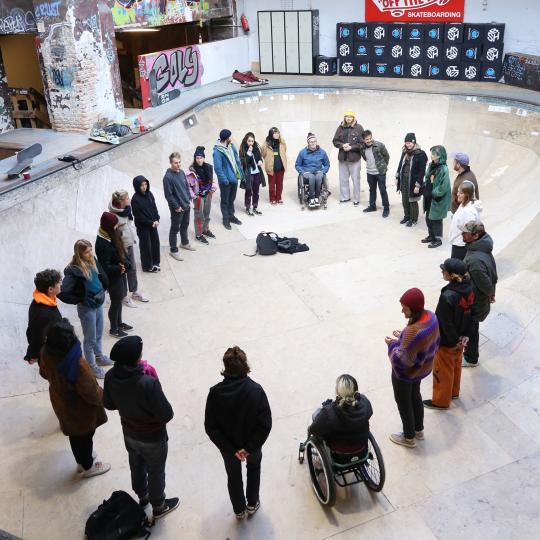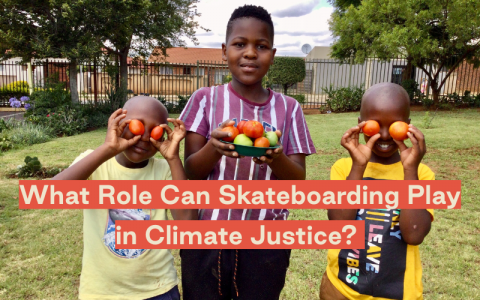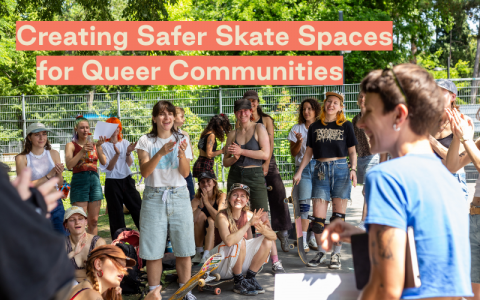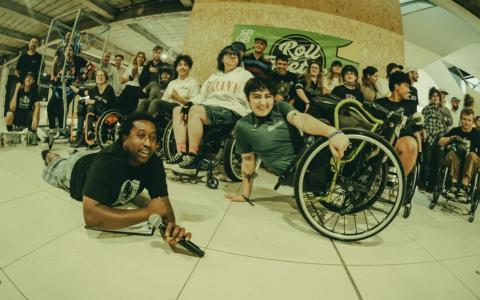What a treat it was to hold an in-person event with 20 other social skateboarding organizations from across Germany! From October 27-29th we gathered at the Skatehalle in Berlin to share ideas and knowledge, collective challenges and ways we can work to tackle them.
Games on Skateboards
We kicked off the event in appropriate style with a workshop on Skate Games. For the same reasons many projects include skate games in their lessons, this helped us to warm up (the skatepark was a bit chilly!), get to know each other and build some trust. It was interesting to learn about the different contexts that skate games work well in and the various methods different organizations use to implement them. In busy, chaotic spaces with high numbers of participants it’s best to keep things structured and simple. In other more controlled environments, highly stimulating games can be beneficial in order to release energy before leading onto teaching more precise skills.
Depending on the groups of people you work with, the games can be changed and adapted for inclusion. For example, running simplified versions if there are language or communication difficulties, or to ensure participation of people with disabilities. We found that most projects present were already using skate games in their lessons, and those who weren’t went away with many ideas to try out! They can be a great asset to skate programs for the trust and companionship they build while encouraging participants to feel more comfortable and relaxed – on their boards and within the teaching space. On top of everything, they are a great way to break the ice and have some fun!
Challenges Faced by Social Skate Projects
Led by Joest and Kim from Drop In e.V., two of our workshops focused on the collective challenges faced by NGOs/social skateboarding projects. From mental health and wellbeing to expansion, accounting and fundraising, finding the perfect team members who balance ‘hard’ and ‘soft’ skills, and the transition from a grassroots project to a registered organization. It was comforting to find that we had all struggled with similar experiences just in different contexts. The main challenge for all being the difficulty of gaining funding in order to allow long-term sustainability and growth. With limited time and resources, it is extremely hard to be running the skate programs on the ground while doing the accounting and measuring impact in order to satisfy the needs of the grant makers. Not to mention the research to find the grants available, completing the application forms and trying to ensure people actually get paid for the hard work they do.
These conversations fed into our workshops on Fundraising and Measuring Impact, where we had more focused discussions on each project's progress and roadblocks. A key point for both areas is the ability to identify what your social skate project does beyond skateboarding. If you can identify this and put the methods in place in order to measure it, then you will be producing quality monitoring and evaluation and most likely able to satisfy potential funders and complete ongoing reporting. The tricky part as always is finding the methods to monitor qualitative improvements such as mental health and wellbeing. Some tips for this can be found in the Goodpush Library.
An overriding topic of interest was the intersections between skateboarding as a sport, as a culture, and as social work. How these differing elements feed into each other and enrich skateboarding, and equally how they can form divides. Do structured skateboarding programs (social work) and inclusion in the olympics/formal competitions (sport) ruin the ‘culture’ of skateboarding? Or do they add even deeper nuances to a tradition which is, like everything, constantly changing and evolving? With culture should come solidarity, but without allyship and inclusion which people are the ones standing together?
Making Skateboarding More Inclusive
On day two we split into groups to discuss FLINTA* inclusion (German abbreviation for women, lesbians, intersex, non-binary, trans and agender people) and the inclusion of refugees/displaced communities in skateboarding programs. With displaced communities around the world growing all the time, and the myriad mental health and wellbeing challenges this brings, many social skateboarding projects are beginning to focus more on the inclusion of refugees, asylum seekers and migrants.
We spoke a lot about the barriers that may affect people from these communities joining skateboarding programs – such as living situations, lack of opportunities, unstructured routines, or even fear to move around cities/leave the home. In fact, we saw in both workshops that when it comes to creating safe spaces for displaced communities and those from FLINTA* groups, building trust is an essential part of the work. Moreso, extra outreach often needs to be done to ensure that these communities know they are welcome, that your team not only reflects the diversity it wants to see, but is sensitive to the issues marginalized groups may face.
On the topic of inclusive language, we all admit it is often hard to keep up with the way things are progressing. It is not always easy to ensure that everyone feels welcomed to your programs through the language you use. You have to be open to keep listening to others and adapting, perhaps using more imagery to carry through your ethics. A nice idea we saw from Berlin-based Skatesencia was inviting people from their FLINTA* sessions to design the graphics for the meet ups. As well as changing locations for more exposure and reclaiming of spaces, this helps to practice the inclusion and diversity we preach.
Accessible Skate Programs and Mental Health
On the final day of the event we had two great workshops led by guest facilitators – an Accessible Skateboarding workshop with Linda Ritterhof (Berlin On Board), David and Lisa Lebuser (Sit’n’Skate) and a Mental Health and Self-Care workshop with Sophie Friedel (Drop In Ride Out). We discussed the widespread inaccessibility of skateparks, especially in the DIY scene. As Lisa rightly points out, when it comes to the actual design and construction of skateparks the people building them already have the necessary skills to make them easily accessible - “You’re building ramps, just build a couple more!”
We certainly learnt a lot throughout the three days of how to make our skateboarding programs more accessible to wheelchair users and those with disabilities. Not just ensuring extra staff to help with pushing and more one-to-one tuition, but also how to look at your teaching space before starting a program to make sure it is set out for inclusion from the outset.
When it comes to looking after the mental health of our participants, we circled back to the discussion on the social work elements of running skateboarding programs, especially with vulnerable youth. We discussed how the complexities of our work should demand that we complete external training on how to work with young people who may be experiencing mental health issues. On top of that, how important it is to know your strengths and abilities; that you cannot always be the one to provide direct support, but to know how to flag up certain situations or to refer people to the appropriate services.
Sophie’s workshop on Self-Care for Skate Facilitators was a great reminder that we also need to look after ourselves in order to run effective programs and sustainable organizations. It was a great reminder of just how effective active listening can be, as well as simply being there for people and checking-in with each other. We can use these simple skills everyday and they can make a huge difference for others – to feel seen, heard and listened to – and for ourselves.
Final Thoughts
The main takeaway from the event was that so much learning is possible when we network and come together to share and exchange. However, an important comment to mention was that resources and training/events should be available in more languages, so that areas where English is less widely spoken can also benefit from the exchange. Another topic which was discussed throughout the event was the need for a directory or place where information of available grants for social skateboarding projects is accessible. At the Goodpush Alliance we are always exploring opportunities to get more funding to grassroots social skate projects, and we would also encourage everyone to be actively using our Goodpush Forum as a place to share funding opportunities and ideas.
Thank you so much to all those who attended and shared their ideas throughout the three days. A special thank you to our co-hosts Drop In e.V. / Berlin Skatehalle – and to the German Postcode Lottery for providing funding for this Goodpush Alliance event.
